Related Research Articles
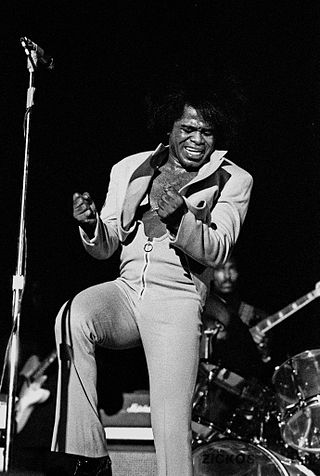
James Joseph Brown was an American singer, dancer, and musician. The central progenitor of funk music and a major figure of 20th-century music, he is referred to by various nicknames, among them "Mr. Dynamite", "the Hardest-Working Man in Show Business", "Minister of New Super Heavy Funk", "Godfather of Soul", "King of Soul", and "Soul Brother No. 1". In a career that lasted more than 50 years, he influenced the development of several music genres. Brown was one of the first ten inductees into the Rock and Roll Hall of Fame on January 23, 1986. His music has been heavily sampled by hip-hop musicians and other artists.

Live at the Apollo is the first live album by James Brown and the Famous Flames, recorded at the Apollo Theater in Harlem in October 1962 and released in May 1963 by King Records. Capturing Brown's popular stage show for the first time on record, the album was a major commercial and critical success and cemented his status as a leading R&B star.

This is a discography chronicling the musical career of James Brown. Brown joined Bobby Byrd's vocal group The Flames in 1953, first as a drummer, and then as leading front man. Later becoming The Famous Flames, they signed with Federal Records in 1956 and recorded their first hit single, "Please, Please, Please", which sold over a million copies.
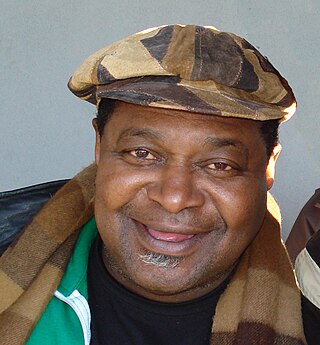
Alfred James Rogers, known as Pee Wee Ellis due to his diminutive stature, was an American saxophonist, composer, and arranger. With a background in jazz, he was a member of James Brown's band in the 1960s, appearing on many of Brown's recordings and co-writing hits like "Cold Sweat" and "Say It Loud – I'm Black and I'm Proud". He also worked with Van Morrison. Ellis resided in England for the last 30 years of his life.
VH1 hosted the first annual VH1 Divas concert in 1998. VH1 Divas Live was created to support the channel's Save The Music Foundation and subsequent concerts in the series have also benefited that foundation. The VH1 Divas concerts were a follow-up to the channel's annual VH1 Honors benefit concert that ran from 1994 to 1997, airing annually from 1998 to 2004. After a five-year hiatus, the series returned in 2009 with a younger-skewed revamp. In 2010 the concert saluted the troops and in 2011 it celebrated soul music, doubling the previous year's ratings. After a dance music-focused 2012 edition aired live from the Shrine Auditorium in Los Angeles on December 16, 2012, the show took another hiatus before being revived on December 5, 2016, at the Kings Theatre in Brooklyn, New York with a holiday theme and achieved its highest ratings in over a decade.
"There Was a Time" is a song written and performed by James Brown.
"Cold Sweat" is a song performed by James Brown and written with his bandleader Alfred "Pee Wee" Ellis. Brown recorded it in May 1967. An edited version of "Cold Sweat" released as a two-part single on King Records was a No. 1 R&B hit, and reached number seven on the Pop Singles chart. The complete recording, more than seven minutes long, was included on an album of the same name.

The Famous Flames were an American rhythm and blues, soul vocal group founded in Toccoa, Georgia, in 1953 by Bobby Byrd. James Brown first began his career as a member of the Famous Flames, emerging as the lead singer by the time of their first appearance in a professional recording, "Please, Please, Please", in 1956.

"Mother Popcorn (You Got to Have a Mother for Me)" is a song recorded by James Brown and released as a two-part single in 1969. A #1 R&B and #11 Pop hit, it was the highest-charting of a series of recordings inspired by the popular dance the Popcorn which Brown made that year, including "The Popcorn", "Lowdown Popcorn", and "Let a Man Come In and Do the Popcorn". The "mother" of the song's title was, in the words of biographer RJ Smith, "[Brown's] honorific for a big butt".
The Beatles Anthology is a documentary television series on the career of the Beatles. It was broadcast on UK television in six parts on ITV between 26 November and 31 December 1995, while in the United States it was seen as three feature-length episodes on ABC between 19 and 23 November 1995. It was released in greatly expanded form as an eight-volume VHS set and an eight-disc LaserDisc set on 5 September 1996. The series was re-released on DVD in 2003, with an 81-minute special-features disc.
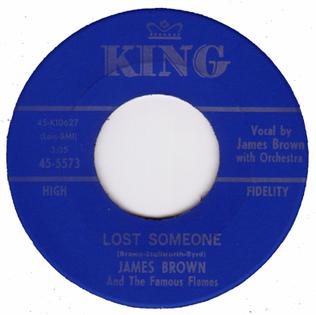
"Lost Someone" is a song recorded by James Brown in 1961. It was written by Brown and Famous Flames members Bobby Byrd and Baby Lloyd Stallworth. Like "Please, Please, Please" before it, the song's lyrics combine a lament for lost love with a plea for forgiveness. The single was a #2 R&B hit and reached #48 on the pop chart. According to Brown, "Lost Someone" is based on the chord changes of the Conway Twitty song "It's Only Make Believe". Although Brown's vocal group, The Famous Flames did not actually sing on this tune, two of them, Byrd and Stallworth, co-wrote it with Brown, and Byrd played organ on the record, making it, in effect, a James Brown/Famous Flames recording.

Love, Power, Peace: Live at the Olympia, Paris, 1971 is a live album by James Brown. It is the only recording that documents one of his live performances with the original J.B.'s lineup featuring Bootsy and Catfish Collins. Love, Power, Peace was originally intended for a 1972 release as a vinyl triple album, but was cancelled after the key members of the original J.B.'s left Brown to join Parliament-Funkadelic. The album was finally released for the first time in 1992, edited down for a single compact disc; the full show, using Brown's original mixdown was later released in July 2014 on Sundazed Music.
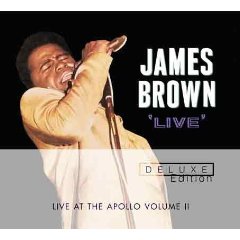
Live at the Apollo, Volume II is a 1968 live double album by James Brown and The Famous Flames, recorded in 1967 at the Apollo Theater in Harlem. It is a follow-up to Brown's 1963 recording, Live at the Apollo. It is best known for the long medley of "Let Yourself Go", "There Was a Time", and "I Feel All Right", followed by "Cold Sweat", which document the emergence of Brown's funk style. It peaked at #32 on the Billboard albums chart. Robert Christgau included the album in his "basic record library" for the 1950s and 1960s.
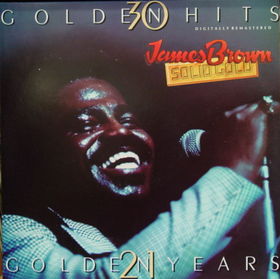
Solid Gold: 30 Golden Hits, also called 30 Golden Hits/21 Golden Years, is a greatest hits compilation album by James Brown. The double album set was initially released in 1977 on Polydor, and was re-released by the label in 1986. The album's liner notes listed the release dates and U.S. chart positions for each song and included an essay by Cliff White. This is the first compilation album to include Get Up(I Feel Like Being a) Sex Machine. According to Allmusic reviewer William Ruhlman, the collection was "state-of-the-art", an influential model "not only...for the many Brown compilations that would follow in later years, but also for the compilation boom in general". In 1981, Village Voice critic Robert Christgau described it as "an essential collection." Allmusic indicates that it supplies "the essence of James Brown", but also states "[i]t has since been superseded by the 1991 four-disc Star Time boxed set".
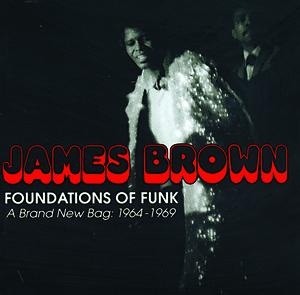
Foundations of Funk – A Brand New Bag: 1964–1969 is the second of several James Brown era overviews released by Polydor Records in the mid-1990s. Expanding on the 1984 LP compilation Ain’t That a Groove - The James Brown Story 1966–1969 it covers 1964 to 1969.

Say It Live and Loud: Live in Dallas 08.26.68 is a live album by James Brown released in 1998. Taped at Dallas Memorial Auditorium soon after "Say It Loud – I'm Black and I'm Proud" had been released to the airwaves, it includes one of the only live recordings of the song, with the arena crowd shouting the call and response portions. Village Voice critic Robert Christgau deemed it the second best live recording from Brown's "crucial" 1967–71 period, behind 1970's Sex Machine. Following the 50th anniversary of the recording, the entire performance, including never before released live performances of "That's Life" and "The Popcorn", was released on vinyl by Republic Records on October 12, 2018.
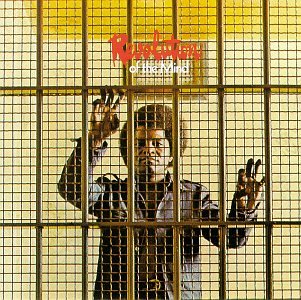
Revolution of the Mind: Live at the Apollo, Volume III is a live double album by James Brown released in 1971. As its subtitle suggests, it is Brown's third album recorded at the Apollo Theater, following the original Live at the Apollo (1963) and Live at the Apollo, Volume II (1968).
Live at the Boston Garden: April 5, 1968 is a concert film starring James Brown. Recorded at the Boston Garden by WGBH-TV the night after the assassination of Martin Luther King, Jr., it was broadcast live in an effort to quell potential riots in the city. The recording circulated as a bootleg before it was officially released on DVD by Shout! Factory in 2008 as part of the box set I Got the Feelin': James Brown in the '60s. It received a stand-alone release in 2009.

Cold Sweat Plays J. B. is an album by trombonist Craig Harris' tribute band Cold Sweat performing compositions by James Brown which was recorded in 1988 and released on the JMT label.

JB40 – 40th Anniversary Collection is a greatest hits album by James Brown. Following Brown's death in 2006, it was repackaged under Universal Music's Gold series.
References
- ↑ Goldman, Albert. "Does He Teach Us the Meaning of 'Black Is Beautiful'?". The New York Times June 9, 1968. Rpt. in The James Brown Reader: Fifty Years of Writing About the Godfather of Soul. Ed. Nelson George and Alan Leeds. New York: Plume, 2008. 39-42.